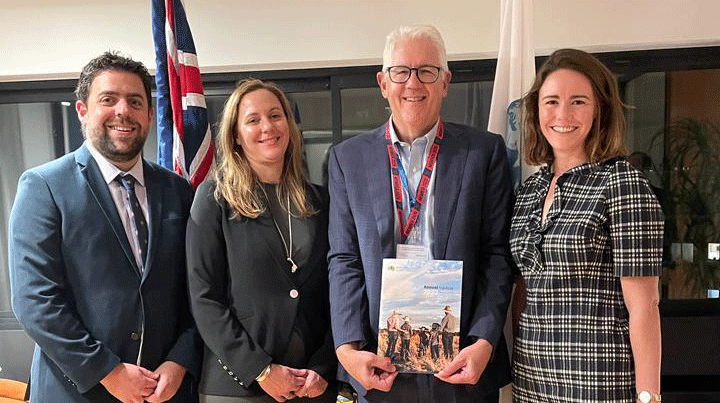European negotiators impressed by the ‘Australian way’ of sustainability

Caption: Mary Johnson (far right), MLA Market Access Manager, Europe, with Jacob Betros (MLA Manager – Beef Sustainability), Margaret Jewell (MLA – CN30 Manager), and Brendan Pearson (Ambassador and Permanent Representative of Australia to the OECD).
Industry leadership lays groundwork for sustainability negotiations
The ‘Australian way’ of beef and sheep industries voluntarily committing to continual improvement in the areas of sustainability and climate-positive production will be an important component of communicating Australia’s trade and sustainability story, particularly in light of Free Trade Agreement negotiations between Australia and the European Union.
That’s the view of London-based Mary Johnson, Meat and Livestock Australia’s (MLA) Market Access Manager in Europe, after the thirteenth round of negotiations on an Australia-EU FTA took place in Brussels on 17-21 October.
Ms Johnson said the Australian Beef Sustainability Framework (ABSF), along with the Sheep Sustainability Framework (SSF) were an excellent resource to engage with negotiators, policy makers and European member states to explain the work Australia is doing.
“The ‘Australian way’ that sees industry taking a leadership role in environmental commitments is quite different to the European way of doing things,” Ms Johnson said.
“We’re unique in many ways because we are not waiting for government to set targets and provide directives. In Europe, it is much more likely that regulation and subsidies will drive practice change, so the ‘Australian way’ of doing things is quite different..
“Our sustainability frameworks allow us to communicate the Australian industry’s commitment to transparency and continual improvement and our engagement with global customers to monitor expectations.”
While regulatory issues in Brussels were not all directly related to the beef industry, Ms Johnson said sustainability is a ‘hot topic’ and Australia is monitoring a range of EU policy dossiers and initiatives. These include the Farm to Fork strategy which aims to make food systems fair, healthy and environmentally friendly; animal welfare legislation revision; and the European Green Deal, which includes a target of no net emissions of greenhouse gases by 2050.
Livestock producers across Europe are being put under pressure through regulation to reduce their environmental impact, with Dutch and Irish farmers already facing calls to decrease their herd size to reduce nitrogen pollution from animal waste.
In June this year, the EU signed an FTA with New Zealand which it described as including ‘groundbreaking’ commitments on sustainability, and it has indicated that this style of agreement is what they will be seeking in FTAs currently under negotiation.
The agreement commits the parties to effectively implement the Paris Agreement and work together on climate-related matters, including carbon pricing or transition to a low-carbon economy.
It includes a dedicated chapter on Trade and Sustainable Development and a Sustainable Food Systems chapter, which commits the EU and NZ to cooperate on strengthening policies and defining programs that contribute to the development of inclusive, healthy and resilient food systems, and to jointly engage on the transition towards sustainable food systems.
Ms Johnson said other producers and exporters of beef are broadcasting their sustainability stories, including Ireland, Canada and Uruguay, and European retailers and the food service sector are also publicising their initiatives.
The EU has said in negotiations with Australia that it aims to include ambitious provisions on trade and sustainable development, showing a shared commitment to labour rights and environmental protection (including climate change) in the proposed FTA.
To ensure Australia is positively positioned for global market access, Ms Johnson said the beef industry needs proactive, industry-led initiatives, ongoing investment in R&D to ensure we remain best in class, collaboration with government, and to share positive stories, while remaining transparent about the areas where improvement is needed.
“The Australian beef and sheep sectors have a great story to tell. We’ve shown real leadership in our ambition to be carbon neutral and indicate a commitment to continual improvement in the areas of sustainability and climate positive production,” she said.
Australia has already signed an FTA with the United Kingdom, marking a significant step to restoring access to what had been a key market for beef exports.
Once ratified, the A-UK FTA will deliver a substantial increase in tariff-free Australian beef access to the UK in year one, and transition to tariff and quota-free trade over a fifteen-year period.